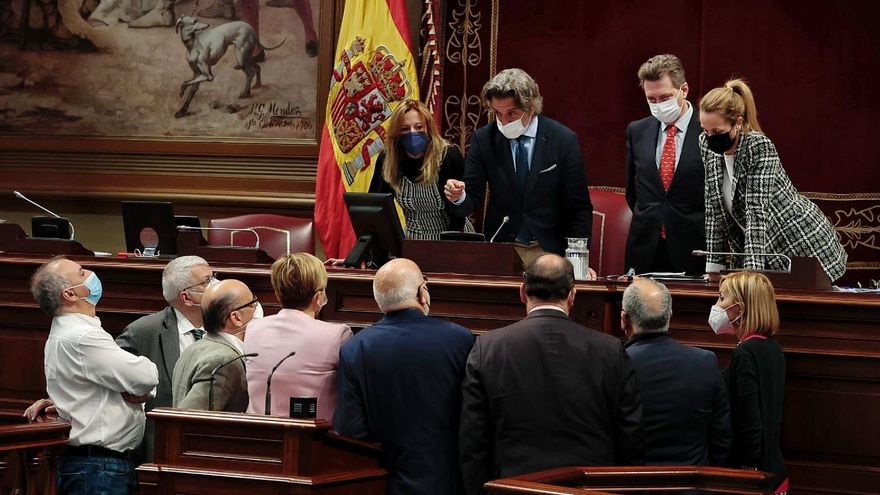
The three deputies of Podemos in the regional parliament they are the only ones who voted this Wednesday against requesting the inclusion of the Gran Canaria and southern Tenerife train projects in the General Interest Railway Network. The entry of the two large island projects into that network would commit the central government to financing the cost of the trains. Not surprisingly, that list includes the “essential” infrastructures for the “correct functioning” of the national transport system, they explain from the Ministry of Transport, Mobility and Urban Agendawho drives Rachel Sanchez Jimenez. All the parties with representation in the regional Chamber thus agree on the importance of strain the two macro-projects among the general interest plans of the State; all except we can. The purple political force is immersed in the contradiction of defending the need for the train for Gran Canaria –where they are part of the Cabildo government– and at the same time rejecting that of the south of Tenerife, where they are not part of the executive of the island corporation but are fundamental for the government of the PSOE and Ciudadanos (Cs). In fact, it is the external support of Podemos that gives the majority in the votes to the government chaired by the socialist Peter Martin.
The Non-Law Proposal (PNL) that this Wednesday approved by a very large majority the plenary session of the regional Chamber was debated at the request of the deputy of Cs Ricardo Fernandez de la Puente. The fact that it was the parliamentarian of the mixed group who presented the initiative is not by chance. Last month, in a plenary session of the Cabildo de Tenerife, the vice president of the island corporation and Fernández de la Puente’s partner in Cs, Enrique Arriaga, was forced to withdraw a motion very similar to the PNL approved in the Chamber in the face of the threat of Podemos to withdraw its support for the Martín government. The purples justify their rejection of the train to the south of Tenerife in that the pact signed with the PSOE on the island of Teide – the pact that commits their external support to Martín – includes the commitment not to implement the project for this infrastructure. However, what they do not want for Tenerife they do want for Gran Canaria. Or when their representatives in the Cabildo, presided over by Anthony Moralesas has been publicly made clear by the purple counselor Conchi Monsoon. A manifest contradiction that did not prevent the parliamentary spokesman for Podemos, Manuel Marreromake sure on the rostrum of the Chamber that his party “maintains its coherence.”
Alternatives
Marrero explained that they are opposed to the trains and are committed to the bus-HOV lanes -High Occupancy Vehicles- and to the new solutions and technologies in transport, with what would then be the representatives of Podemos in the Cabildo de Gran Canaria who would be against the proposals of his own party. Either way, We can called to respect the “autonomy” of both councils, where if there was “consensus” they would not oppose the construction of the trains. Although this does not save his contradiction, the political force now says that a “binding” popular consultation is necessary for the citizens of both islands, a petition that they were going to take to the plenary session this Friday at the Cabildo de Tenerife but that they withdrew from the agenda due to lack of support. An amendment along these lines was also rejected in Parliament. In any case, it would be the president of the Government of the Canary Islands, Angel Victor Torreswho should “propose” the citizen consultation.
As for the other parties, the Agrupación Socialista Gomera and NC share the need for the trains, also because they are more sustainable and less polluting. In the opposition, PP and CC emphasized the double discourse of Podemos, and the nationalists even They slipped that the regional Executive has put the brakes on the Gran Canaria project due to the problems in Tenerife. However, the PSOE supported the Cs initiative; moreover, his deputy Jorge gonzalez He recalled that although the competence in the matter belongs to the councils, it is the regional government that requests the inclusion of the projects in the state network.
















